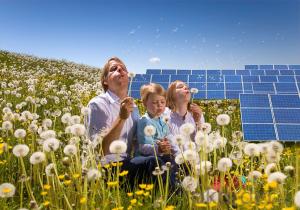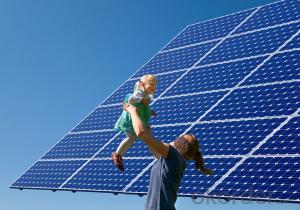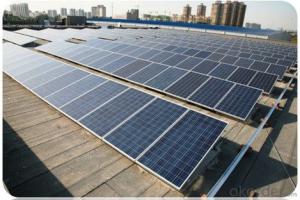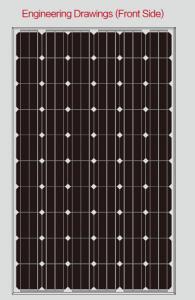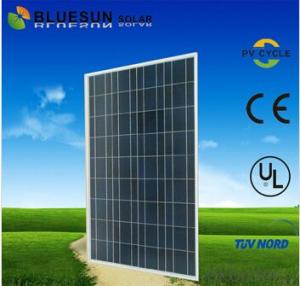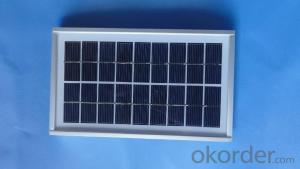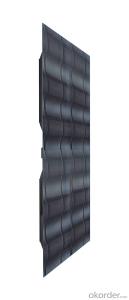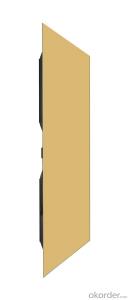Solar Panel 250w Silicon Polycrystalline
- Loading Port:
- Guangzhou
- Payment Terms:
- TT OR LC
- Min Order Qty:
- 200000 watt
- Supply Capability:
- 20000000 watt/month
OKorder Service Pledge
OKorder Financial Service
You Might Also Like
INTRODUCTION
We are a high-tech group wich specializes in solar products design,research, manufacture, sales,solar projects design and installation.
Our national sales service covers seven parts, including northeast, north, east, middle, south, northwest and southwest, international sales covers five continents and over forty countries, including Germany, Italy, Spain, France, America and Brazil etc.
This installation Manual contains essential information for the electrical and mechanical installation that your must know before installing CUSTOMER PV modules. This also contains safety information you need to be familiar with .All the information described in this manual are the intellectual property of CNBM and based on the technologies and experiences that have been acquired and accumulated in the long history of CUSTOMER. This document does not constitute a warranty, expressed or implied.
CUSTOMER does not assume responsibility and expressly disclaims liability for loss, damage, or expense arising out of in anyway connected with installation, operation, use or maintenance of the PV modules. No responsibility is assumed by CUSTOMER for any infringement of patents or other rights of third parties that may result from use of PV module.
CUSTOMER reserves the right to make changes to the product, specifications or installation manual without prior notice.
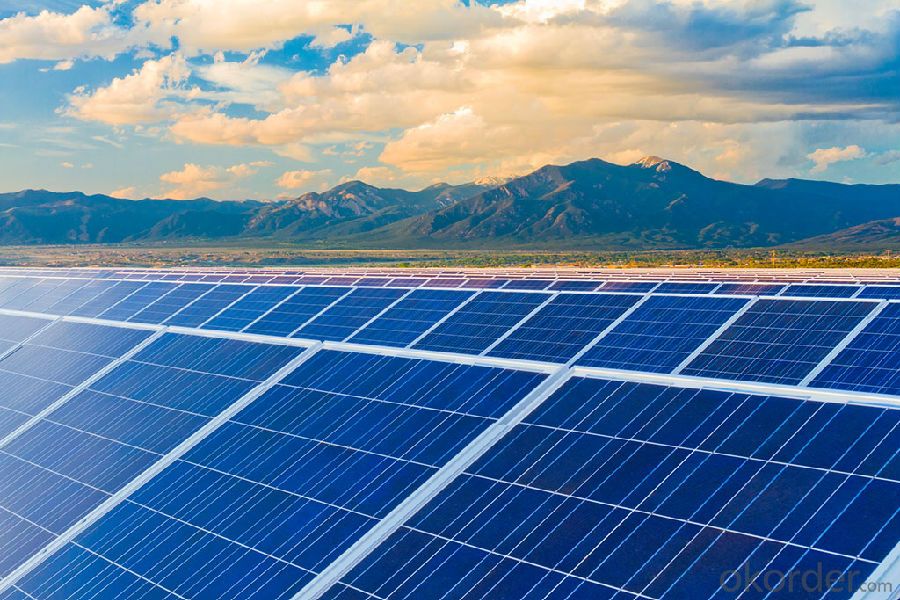
GENERAL INFORMATION
The installation of PV modules requires a great degree of skill and should only be performed by a qualified licensed professional, including licensed contractors and licensed electricians. Please be aware that there is a serious risk of various types of injury occurring during the installation including the risk of electric shock. All CUSTOMER modules are equipped with a permanently attached junction terminal box that will accept variety of wiring applications or with a special cable assembly for ease of installation, and they do not require assembly.
DATA SHEET
Maximum Power | 250W |
Efficiency | 0.154 |
Backsheet | White |
Frame Colar | Silver |
Manufacture Site | China |
Frame | Anodized Aluminum Alloy |
Weight | 19 kg |
FAQ:
Q1: Why buy Materials & Equipment from OKorder.com?
A: All products offered byOKorder.com are carefully selected from China's most reliable manufacturing enterprises. Through its ISO certifications, OKorder.com adheres to the highest standards and a commitment to supply chain safety and customer satisfaction.
Q2: What is a solar PV module?
A: A solar PV module consists of many solar cells that are connected together (typically in series) and packaged in a frame (typically made of aluminum).
Q3: What are the advantages and disadvantages of monocrystalline solar PV modules?
A: Monocrystalline solar PV modules are the most efficient type of solar PV modules, with the exception of CdTe thin film solar PV modules. As a result, monocrystalline solar PV modules are more expensive when compared to almost all other types of solar PV modules.
- Q:How do solar panels affect the property's energy independence?
- Solar panels can greatly enhance a property's energy independence by generating clean and renewable electricity. By harnessing the power of the sun, solar panels reduce the property's reliance on traditional energy sources, such as fossil fuels. The excess energy produced by solar panels can be stored in batteries or fed back into the grid, further increasing the property's self-sufficiency. Ultimately, solar panels enable homeowners to reduce their electricity bills and contribute to a more sustainable and eco-friendly energy system.
- Q:How long do solar panels last?
- Solar panels typically have a lifespan of around 25 to 30 years. However, with proper maintenance and care, they can last even longer.
- Q:I have a college project due within a week, and it involves a 00 Watt solar panel and a 2V 7.5Ah Battery. I got the project finished up and producing free energy for my house in September, however recently the battery I bought, that was specifically made to hold Solar Power, lost its charge (unsure how or why) and it is pretty much useless. Can I just go to a store and buy any 2V car battery to use?
- Those answers are partly correct. You cannot recharge two 2 volt batteries in series with a photovoltaic panel with an open circuit voltage of 8 volts. You possibly over charged your 7.5 AH battery with a 00 watt photovoltaic panel, which can supply 8 amps to the battery with unusually bright sun light = fully charged in one hour. More likely you did not charge the battery for a month or more which killed it. Also discharging below 2.6 volts shortens the life of the battery, or short circuiting the terminals even briefly. Yes a deep cycle sealed lead acid battery rated 2 AH is likely the best unless you buy a 00 amp hour marine battery which weighs about 80 pounds and will take at least two days of bright Sun to fully charge.
- Q:Well my dad has been into Solar panels for quite a while, his birthday is coming up and i want to get him a small minature one, so he can toy around with it and be able to use it as expirience for when he gets a bigger one. my dad has been doing ALOT of studying, and i've been looking online but idk what kinda kits to get so should i get a 0w kit, 5w kit, or 20w kit? which one would be best to fool around with and play with? thanks
- Go with the 20W kit. Possibly he can get this going and light up a 5 watt bulb? Does he have an inverter? Sounds like fun! I may look into this later. I did notice that our interstate uses these small ones along the way for something. I have something more interesting; plans for a window solar panel box made out of most scrap items lying around. Just moved so have to unpack and find those plans! Anyway, have fun and hope your dad likes his kit.
- Q:Photo-Voltaic solar panels are very expensive. Most of a home's energy needs are for heating water, heating and air-conditioning. All of these can be met with thermal solar collectors which are much less expensive. The thermal solar panels would heat water stored in a hot water tank which then can be used as hot water, to heat the home, or as the heat source to a Lithium Bromide Absorption chiller to air-condition a home. With the base line needs met without expensive panels and without inefficient energy conversions, only a small Photo-Voltaic array would be needed for the remaining power needs and since those needs are variable, there would still be power to sell to the grid.
- I agree with you John and for the same reason already put forth as a negative. Solar thermal is a more mature technology. This is the reason why I spent so much of the last winter studying it. I can be reasonably sure that what I learn will not be obsolete tomorrow with a new technological breakthrough. I built a solar addition/greenhouse to personally study the effects. So solar thermal panels are not the only way to go. With respect to electrical production. I have seen parabolic reflectors coupled to stirling engines and solar thermal trough heaters used to supplement steam generation for alternatively gas fired steam / electrical generation plants. On a trip to China over 4 years ago I noticed solar hot water vacuum tube collectors being sold in their local hardware and big box style stores. These were gravity fed package units intended to have the tank on the roof with a supplemental electric backup. The vacuum tube collectors seem to be one of the latest innovations in this technology. Using phase change materials temperatures in these panels can be produced in excess of 400 deg F. and they are useful in colder temps and on cloudy days. While they are still costly for many applications, I have been discussing the use of vacuum tube collectors with the owner of a laundrymat. Solar thermal will not pay back as well as conservation in many cases of older construction, but it currently seems better than photovoltaic panels. Solar thermal requires more understanding of systems and relative efficiencies. In one way solar thermal is more like the electric car while the internal combusion engine is like photovoltaic. The idea of producing electricity from the sun is a sexier idea. It is also more in line with our paridigm of: just producing lots of energy and to H with any conservation efforts. For that reason it seems to get more press.
- Q:How about using Solar Panals to provide the electrical power to separate the H2 from the O? H2 would be fed into the engines carburator like a gas/air mixture ratio, but H2/air mixture ratio instead. How would you control the exact measurements?
- H2 has more energy per weight – but requires twice the volume of fuel. It is unsafe to transport as a liquid or gas (usually in a carrier medium of some sort) Solar panels are expensive (low output per $) and expire after some use. They are dirty and energy inefficient to make too. However: hydroelectric, wind, and sea technologies may offer some improvements in costs with oil prices as high as they are.
- Q:how to market solar energy products?
- It depends upon your product. If it is a solar panel, I want to know if it is a photovoltaic panel or a thermal panel. If you don't know enough to know the difference for your question it might be somewhat difficult to suggest others should buy them. Products have to be marketed to a need either already felt or not so apparent. Photovoltaic panels supply an electric need and will offset electrical usage or may supply the grid if there is excess power. A discussion of payback periods including property values will be needed in any event. Thermal panels supply heat and hot water. They are more efficient than photovoltaic panels and will give faster payback times. (are cheaper) If you are a bit more specific more information may be possible.
- Q:Can solar panels be installed on walls?
- Yes, solar panels can be installed on walls. While they are commonly mounted on rooftops for optimal sun exposure, they can also be installed on walls using specialized mounting systems. Wall-mounted solar panels are a viable option for locations with limited roof space or where the roof is not suitable for installation.
- Q:For those solar panels that you install on your rooftops, do they generate electricity when it's cloudy? And if yes, how much electricity does it generate compared to sunny days? For example...like only 25% electricity generated compared to sunny days?
- From my understanding they generate electricity when the suns out and when its out and there aren't too many clouds around covering up. They store some electricity for the winter and cloudier times but I'm not really an expert!
- Q:What is the average size of a solar panel?
- The average size of a solar panel is typically around 65 inches by 39 inches, or approximately 5.4 feet by 3.25 feet. However, the actual size can vary depending on the manufacturer and the specific model of the solar panel.
1. Manufacturer Overview |
|
|---|---|
| Location | |
| Year Established | |
| Annual Output Value | |
| Main Markets | |
| Company Certifications | |
2. Manufacturer Certificates |
|
|---|---|
| a) Certification Name | |
| Range | |
| Reference | |
| Validity Period | |
3. Manufacturer Capability |
|
|---|---|
| a)Trade Capacity | |
| Nearest Port | |
| Export Percentage | |
| No.of Employees in Trade Department | |
| Language Spoken: | |
| b)Factory Information | |
| Factory Size: | |
| No. of Production Lines | |
| Contract Manufacturing | |
| Product Price Range | |
Send your message to us
Solar Panel 250w Silicon Polycrystalline
- Loading Port:
- Guangzhou
- Payment Terms:
- TT OR LC
- Min Order Qty:
- 200000 watt
- Supply Capability:
- 20000000 watt/month
OKorder Service Pledge
OKorder Financial Service
Similar products
New products
Hot products
Related keywords
